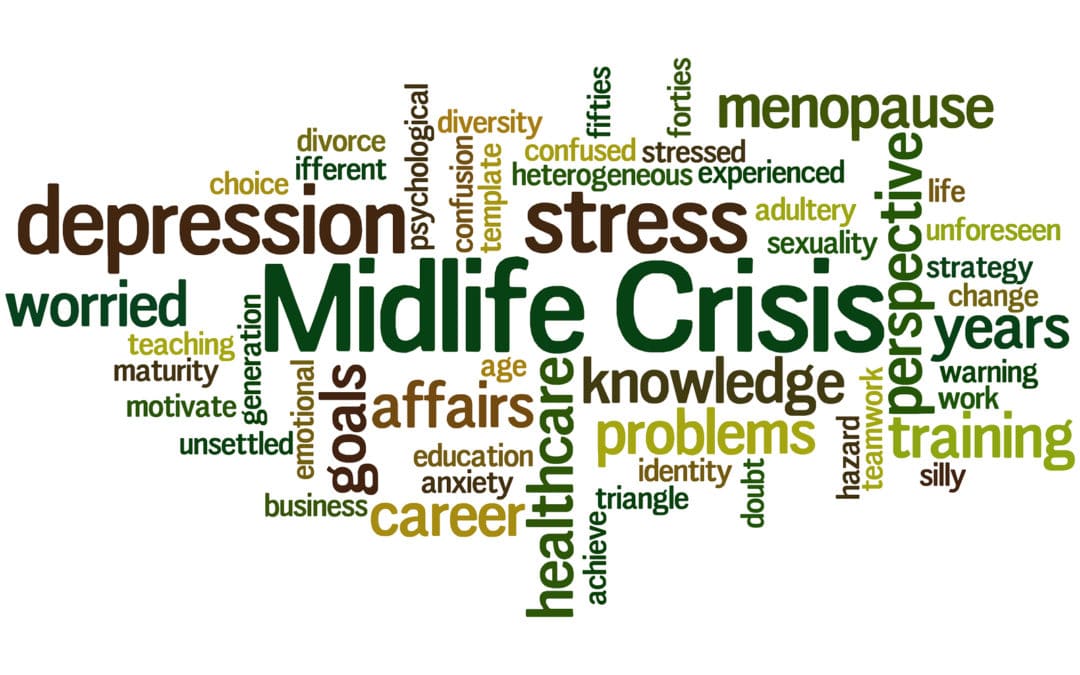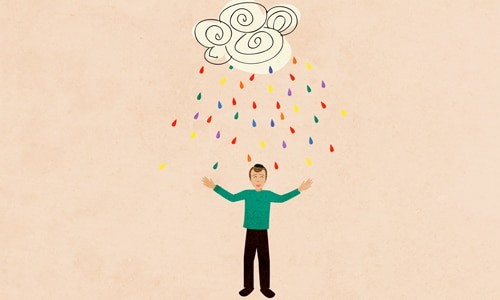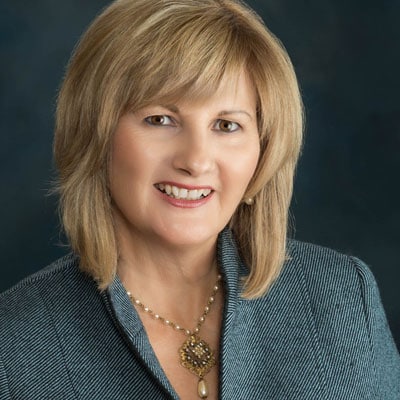By Diana Creel Elarde
In the past when I attempted to explain my midlife crisis to others, I often shared it as a time of struggle and hardship. However, as I’ve aged and my wisdom has grown, I now see this time period as not only the hardship that it was, but also as a time when opportunity came knocking at my door, inviting me to “take another look” and turn towards “another direction” in life. Hardship or opportunity? This is why explaining what a midlife crisis is, is so difficult.
I think of it now as the time in my life when all roads seemed to collide at once. The end of parenting as I knew it (dare I say the words “empty nest”), the dissatisfaction with my career and the looming realization that my father’s life expectancy was now measured in months. They all came together in one moment, crashing with an unplanned, unwanted and certainly unanticipated impact, to create a life in chaos – a midlife crisis.
Events such as these are not unusual during our midlife period, a time slot between 45 and 64 years of age for most people. Some experience a creeping realization that life is not going in the direction that was planned. And for others the crisis unfolds , as mine did, with a whirlwind of change in a short period of time.
Events that can cascade us into a midlife crisis can include:
- Dissatisfaction with our career
- Empty Nest
- Divorce/Relationship challenges
- Impending or actual death of a parent, spouse, or child
- Longing for our “lost” youth
- Daily routines feeling empty without purpose
- For women, menopause
- For men, physical shortcomings now coming into play
- Generally being unhappy with our lives
So what is a midlife crisis? “Midlife crisis” as described in psychology studies is an emotional crisis of identity and self-confidence coupled with remorse, depression and/or the overwhelming feeling of the need to redirect your life. It can last 3-10 years on average for men, for women 2-5 years.
A Male Crisis or a Redirect?
Classically when we think of men having a midlife crisis, visions of the new sports car or the Harley Davidson and a new look complete with aviator sun glasses comes to mind. In extreme cases it can include abandonment of the marriage perceived to be holding him back or causing his unhappiness. And yes…the pursuit of younger women, revitalizing dormant sexual desires and carrying him back to the days of youth. Or, as characterized in the movie City Slickers, life as a “do-over”.
Career frustration is another common ingredient in a man’s period of crisis. It may be the realization that career dreams or goals will no longer be achieved, or just the desire to break out and use your life experience to start your own venture. The average age for men to expand into their own business in the U.S. is 46 years. Depending on financial stability, this can be a good time to launch, or instead have the effect of creating a further crisis on home and family due to new financial burdens.
Image via Economic Times Blog
Anger and depression are sometimes the negative side of the midlife crisis for men. Lashing out at family members, particularly a spouse can commonly occur. Some will reach out to their peers, closing out family members, while others seek isolation from all to nurse their unresolved feelings.
Other factors which can indicate a life in crisis include:
- Tiredness
- Increased need to demonstrate masculinity
- Impulsive behaviors
- Failing memory issues
- Erectile dysfunction
Research has indicated the midlife crisis is not simply an emotional or psychological problem. A shift in hormone levels, which is common for men during this age period, can lead to many of the conditions outlined above. A comprehensive physical with the family doctor could identify and offer some support for these symptoms.
Exercise still remains one of the best defenses against pain, premature aging and emotional lows. Raising the quality of life through proper nutrition, activity and socializing are key factors in our maturation process.
Psychologist Erik Erickson described this stage in adult development using the terms Generativity versus Stagnation. Do we now reach out and create a better world, moving toward growth and contribution, or do we stagnate and fail to achieve? I often think of the statement: he died at 50, we buried him at 70. Who hasn’t seen those who gave up at work or in life and became angry old men, without a good word for life, family, or the next generation?
The movie, City Slickers was reflective of three men in different stages of life, all facing life crisis and trying to challenge their lives with a cowboy experience for two weeks. Mitch, aka Billy Crystal, our lovable hero is in the throes of his midlife crisis. He’s unhappy with his career, not sure where his priorities are anymore. The old rugged cowboy Curly, aka Jack Palance, offers up his advice, raising his index finger as a gesture to represent his philosophy. “The secret to life is one thing…just one thing. You figure out that one thing and nothing else matters.”
Not surprisingly many psychologists recommend the same advice as Curly: assess what is important and what you want out of life. The clearer it becomes, especially for men, the easier and the quicker the transition. Keep in mind a midlife crisis for men can last up to ten years. These can be years spent in limbo, in the unknown, unless an honest self-assessment is undertaken to understand what actual issues need to be faced. Prolonged periods of chaos are not only hard on the individual, but also on family members who can be dragged through the turmoil, creating difficult and hurt relationships which can be hard to mend.
Transition in life is inevitable; making conscious decisions is a choice.
Menopause: Herald of Midlife, or Awakening?
Image via HealthyWomen
While both men and women will have a change in hormone production during midlife, often subtle and difficult to realize, women have a clear signal – menopause. The ceasing of a woman’s monthly menses brings on an array of symptoms and can last up to a ten years. Most women will experience at least some of a range of symptoms hard to ignore:
- Hot flashes
- Major sleep disruption
- Hormone fluctuations
- Exhaustion both physically and mentally
- Weight gain
The critical part of this time period in a woman’s life is providing the support the body needs to transition with the least amount of impact on health. It is very much what you do, the type and amount of exercise undertaken and what you eat that impact the quality of life during menopause. Traditional Western medicine as well as Oriental Medicine such as acupuncture and herbs can offer relief from symptoms which can affect the menopausal woman’s comfort, brain clarity, and sleep. If high stress is present and not addressed, it can compromise the adrenal system leading to extended exhaustion.
A doctor of Oriental Medicine may be a better choice than to try to self-medicate with popular herbs. I was surprised through my own experience to find that many of the herbal remedies commonly used for physical discomforts were actually counter-productive for a menopausal woman. Doctors of Oriental Medicine have had the medical training necessary to diagnose your condition and prescribe herb remedies based on your particular physical needs.
Dr. Christian Northrup refers to the midlife crisis and menopause for women as “the wakeup call”. Her research finds that women’s brains start to change in midlife and women may find the need to be more creative. Northrup refers to this “as the overwhelming desire to “birth themselves”. Returning to college for a much-wanted degree, taking on creative outlets such as painting or writing and redefining what self-esteem is can all be part of this journey.
In my years as a college professor I always looked forward to working with midlife women returning to college. It takes a bit of courage to sit in a class after decades away from school, with the majority of people in the room half your age. Once these women find their “wings” and start to experience academic successes, they flourished. Finishing a degree and starting a new career just an example of what women can accomplish during this midlife period. In the last ten years we have seen a substantial increase of women in midlife starting their own businesses. Particularly true for women in technology, years of frustration with the glass ceiling has women moving outside of corporate environments to achieve their goals.
Women who have experienced motherhood, also face the transition of becoming more “me” oriented as they release the responsibilities of care for others. Balancing their newly found needs with budding adult children needs can be a challenge. Letting go to gracefully allow these young people to rise and fall on their own can be a lesson unto itself. But as my husband constantly reminds me, we are only the bow; they are the arrow and must soar on their own.
Happy, I think?
The question “am I happy?” may become an issue in a life where one suddenly starts to wonder if they have surrendered their own needs to take care of others and make them happy. The realization that personal happiness may have greatly suffered tends to lead to more questions as to just how you balance personal needs with family and/or work requirements.
Image via Chabad
Writer Gretchen Rubin, author of the Happiness Project, stated it like this: “Do I even know what happiness feels like?” We can certainly fall into life in rote, chores and tasks completed during the day and we never feel engaged. I remember one incident making dinner when my daughter after intently looking at my face asked, mom why don’t you look happy? The answer? I was still mentally at work fighting an issue that eventually got solved on its own. Surprisingly my gnashing it over and over never helped!
While some people may also find their midlife search may lead to the ending of a marriage or moving on from their job, others take it as a chance to shake up their lives and do something completely different. One of my more pleasant shake ups was experiencing life in an old Victorian Michigan town in an upper flat, we called our tree house. Wine bars, great small stores and the local library were within blocks of our place. While this time period is a wonderful memory, it also helped us to conclude relocating back to the Southwest was what we truly wanted.
Finally, professionals suggest reminding yourself to view this time of change as a gift, an opportunity to look within, something many may have put on hold for years. So let those inner dreams out, and see where they take you!
When all Roads Converged
While I’d like to say I recognized my crisis when it came about, the fact is I didn’t. Empty nest wasn’t a phrase I even whispered, yet out of the blue within two weeks I found myself a mother with kids living out of state. My purpose, my reason to work every day had been tied to their lives. I was like a ship adrift, without reason to be.
Couple this with the impending passing of my father and the launching of my own consulting business, I threw myself (and my poor husband) into the soup of chaos.
For close to three years I worked through the difficult days, the despairing moments and finally the rebirth of a life I could truly call my own. Within me I found words to create stories, some with such emotional transparency, that my initial reaction was to hide them the world. It was years before I could call myself a writer, even longer before I could say “author”.
Hiding or in denial? It really doesn’t matter what word you choose in a life crisis, you need to find or redefine your reality. Elizabeth Gilbert, author of Eat, Pray, Love has a wonderful video on YouTube called Success, Failure and The Drive to Keep Creating. In this video she talks about how success and/or failure can fling you from your middle, your core, to the point where you feel lost in your own life. Her advice: Keep doing what you love and don’t focus on success or failure.
Personally, I struggled with the concept of “doing what you love”, and the “just one thing” idea became just one more thing I could not figure out. Try, as I did through years of reading and coaches, this just wasn’t translating to me into a concept I could grasp. That didn’t mean I gave up. Rather I looked for what could work for me, and that became consistently asking, “how do I want my life to feel, and does this experience meet that requirement?”
Perhaps then, in our days of chaos and crisis, rather than flailing about and indulging in temporary and superficial emotional fixes or venting at our loved ones, the best direction we can take may be trying to find what truly matters in our life and how we want it to feel, and above all being patient until the new path becomes clear.
Road Convergence, copyright DElarde, 2018
Diana Creel Elarde is a PSYCH-K® facilitator, author of the book, A Star in My Hand, and a three-time contributing author in the Chicken Soup for the Soul books. You can reach Diana at www.emerginginsightsgroup.com or at [email protected].











I, too, struggled with the ‘do what you love’ and ‘just one thing’ concepts. I thought I had to find my ‘passion’ during this stage of my life and that it would carry me through. I found many ‘passions’, but learned that after a time I no longer could immerse myself in them and find the joy I had previously obtained. I finally decided that, maybe, ‘staying curious’ is my passion, that trying out new activities and experiences is my passion. I want to continue to learn. I’m thinking when the time comes to say goodbye I’ll be saying, “Hold it! Just one more thing I need to know!”
My biggest struggle is the following questions; Are the cause that I am involved with making a difference in this world? Feels that the causes I am involved with are just temporary projects with little lasting effect. I am a techy that strives to use the tools of technology to improve the lives of people of color in Detroit. I am growing tired of “outsiders” saying they are making a positive change but are only profiting from their efforts and the community get very little in return.
Cliff…I hear your dilemma and concern. If you are working towards making a change in the world, I assure you that you are. As I’m certain you’re aware, to create change we must first change ourselves to reflect the change we wish to see. For guidance, listen to what your inner voice is telling you. Continue walking in the direction that speaks to your heart and soul, regardless of what others may do or what they may think. This is your path. Be the best Cliff that you can be. Blessings to you…
I believe what of the hardest things to determine in our life is the impact we have on others. It is difficult to imagine even a small encounter makes a difference, but yet many times it does. Sometimes all you can do is leave others to do what they may and live life as your message. Thank you for your thoughts and comments.
What a wonderful article at just the “right time”. Been struggling for the past few years with this and the effects it’s having on my marriage. It’s frustrating to want to do “what we love”, but also have to consider ones children and husband and remind ourselves that “it’s not always about us” and “this too shall pass”. patience and knowing there is light at the end of the tunnel helps. Blessings
Wise words Linda! All things in good time. Reflecting back I was glad several times that I passed on first opportunities and grateful when they came back around at a time when I could embrace them!